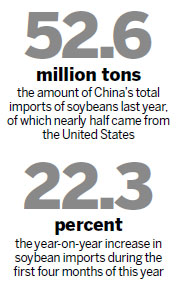Soybean imports from US to decline
Updated: 2012-06-07 09:32
By Zhou Siyu (China Daily)
|
||||||||
|
 |
|
A soybean farm near Tangara da Serra, Brazil. China's large imports of Brazilian beans last fall will further dent its imports from the United States, a regional director at the American Soybean Association said on June 6, 2012. [Photo/Agencies] |
Chinese consumers questioning safety of genetically modified food
The American Soybean Association said it expects China, the world's largest soybean consumer, to import less soybeans from the United States this year, thanks to Chinese government measures last year to contain the country's inflation rate by releasing a large amount of State reserves.
The country's large imports of Brazilian beans last fall will further dent its imports from the US, Paul Burke, ASA North Asia region director, said on Wednesday. But he did not disclose the exact amount of the reduction.
However, driven by its burgeoning livestock industry and ongoing urbanization, China's soybean imports were estimated to continue growing in the long term, Burke added.
China is currently the largest overseas market for US soybean farmers. The country imported 52.6 million metric tons of soybeans last year, nearly half of which came from the US, accounting for 60 percent of total US soybean exports in 2011.
In February, a Chinese trade delegation consisting of major State-owned food companies such as China National Cereals, Oil and Foodstuffs Corp and China Grain Reserves Corp, also known as Sinograin, signed a historic $6.7 billion contract to buy 13.4 million tons of US soybeans.
But given soy oil processors' limited purchases of State reserves, Chinese analysts said the State reserve had only a limited effect on the country's soybean imports from the US.

Gao Yanbin, an analyst with SWS Research Co Ltd, reckons the reduction in soybean imports this year, caused by the release of stocks from the State reserves, could amount to 1 million tons at most.
In the meantime, the pressure of an economic slowdown in China would prevent oil processors from replenishing their inventory, said Ma Wenfeng, a senior analyst at Beijing Orient Agribusiness Consultant Ltd, one of the largest consultancies in the industry.
"Chinese consumers, especially those living in big cities, are starting to question the safety of soybean oil made from genetically modified soybeans," Ma added. That would affect the country's demand for US soybeans.
In a bid to contain inflation, the Chinese government started releasing its national reserve of soybeans at the end of 2010, in order to stabilize the price of cooking oil.
But most of the national reserve has remained untouched over the past two years, as domestic soybeans are generally more expensive than imported beans.
In last month's auction, however, domestic soybeans became popular with oil processing companies, largely as a result of the high price of soybeans on the international market, driven up by a drought in South America and a global tight supply. But even so, only 300,000 tons of soybeans were sold to the companies.
During the first four months of this year, China's soybean imports jumped by 22.3 percent year-on-year to 18.2 million tons, according to the General Administration of Customs.
zhousiyu@chinadaily.com.cn

 Relief reaches isolated village
Relief reaches isolated village
 Rainfall poses new threats to quake-hit region
Rainfall poses new threats to quake-hit region
 Funerals begin for Boston bombing victims
Funerals begin for Boston bombing victims
 Quake takeaway from China's Air Force
Quake takeaway from China's Air Force
 Obama celebrates young inventors at science fair
Obama celebrates young inventors at science fair
 Earth Day marked around the world
Earth Day marked around the world
 Volunteer team helping students find sense of normalcy
Volunteer team helping students find sense of normalcy
 Ethnic groups quick to join rescue efforts
Ethnic groups quick to join rescue efforts
Most Viewed
Editor's Picks

|

|

|

|

|

|
Today's Top News
Health new priority for quake zone
Xi meets US top military officer
Japan's boats driven out of Diaoyu
China mulls online shopping legislation
Bird flu death toll rises to 22
Putin appoints new ambassador to China
Japanese ships blocked from Diaoyu Islands
Inspired by Guan, more Chinese pick up golf
US Weekly

|

|







